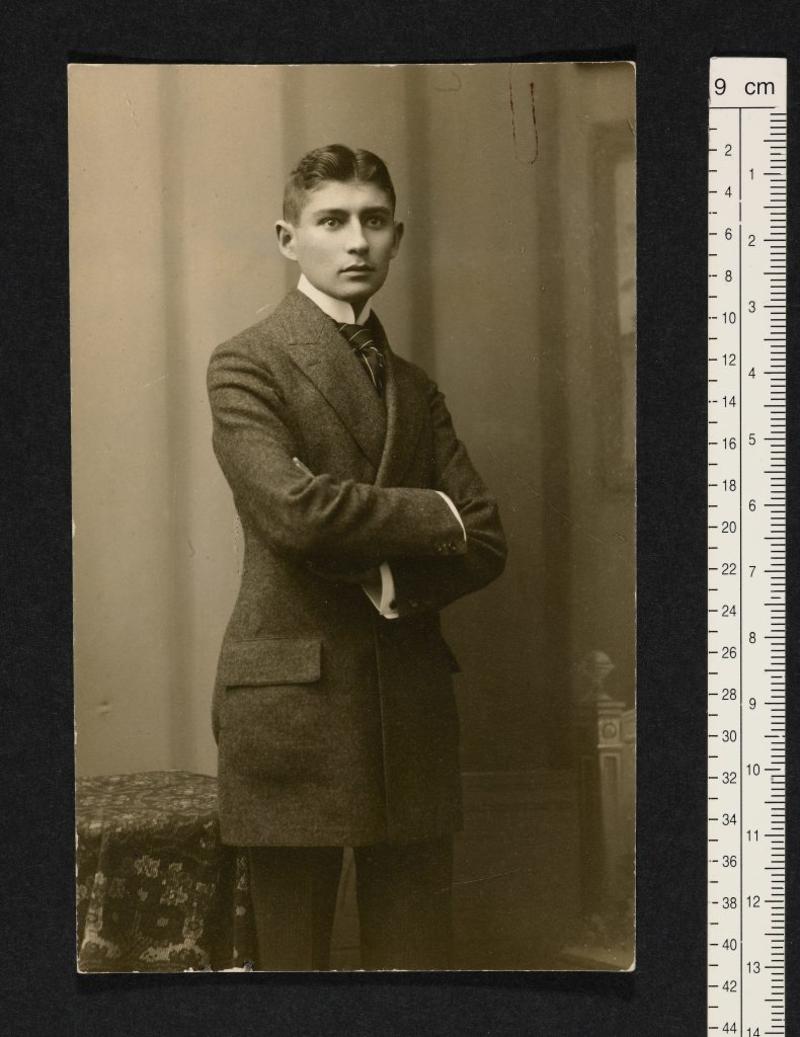Kafka in Oxford: A Short History
How did the autographs of an early-twentieth-century Prague writer end up in Oxford? Interestingly, this situation is not (or only to a small extent) the result of targeted institutional collaboration and primarily the product of a mixture of chance and luck and, most importantly, of personal networks and connections.
In the late 1930s, the life of Max Brod, Franz Kafka’s friend and post-humous editor, became more closely and existentially tied up with the fate of his friend’s manuscripts. In early 1939 he writes to Thomas Mann, who was then living in Princeton, with a major request.[1] His situation in Prague, he notes, was fast becoming untenable as he faced vicious attacks on his work and character in fascist publications such as the Völkische Beobachter, the NSDAP’s official newspaper. He concludes: ‘Ich bin entschlossen, nach Amerika auszuwandern, so lange es noch Zeit ist’ and asks Mann for help with a fast-tracked visitor visa. To secure such a visa, Brod makes a bold suggestion. If Mann were able to arrange for him to be given a teaching position at a US university, he could lecture on Czech politics and music (particularly Janáček) and on Jewish religious politics and philosophy. In addition, Brod offers to bring with him a valuable asset: ‘Ich würde den gesamten, noch unveröffentlichten Nachlass von Franz Kafka mitbringen, dort edieren und ein Kafka Archiv einrichten’.[2] Mann had variously expressed his admiration for Kafka’s works, describing his novels and short stories as ‘beängstigend, traumkomisch, treumeisterlich und krankhaft, die sonderbar eindringlichste Unterhaltung, die man sich denken kann’.[3] Mann passed on Brod’s suggestion to H. M. Lydenberg, Director of the New York Public Library, who responds courteously and with interest but was unable to make Brod an immediate offer due to a recent ‘curtailment of staff’. In the end, Brod did not emigrate to the US but escaped Prague on 14 March 1939, on the last train to leave the city before its invasion by the German army. Carrying Kafka’s papers with him in a suitcase, he travelled through Poland and Romania to Constanza on the Black Sea, where he got on a boat to Athens and thence to Tel Aviv.
Here, he deposited the papers in a bank safe, but during the Suez Crisis of 1956, fearing for their safety, he moved them to a bank vault in Zurich, where they stayed for five years. The next protagonist in the story of Kafka’s manuscripts is Sir Malcolm Pasley, Fellow in German at Magdalen College Oxford, who in 1960 got to know Michael Steiner, Kafka’s great-nephew, who was studying law at Lincoln College. Through Steiner, Pasley discovered that Kafka’s manuscripts were not in fact owned by Brod, as was widely assumed, but by his surviving heirs, his nieces Marianna Steiner, Gertrude Kaufmann, Helena Rumpoltová and Věra Saudková. Through Michael’s mother Marianna, Pasley made contact with the other heirs, who in 1961 placed the manuscripts in the Bodleian Library on permanent revocable loan. When this deal was agreed, Pasley happened to be on skiing holiday in Austria; he drove over to Zurich, checked the authenticity of the papers, insured them for the sum of £100,000 pounds, and drove them back to Oxford in his Fiat.
Kafka’s presence at Oxford and Malcolm Pasley’s service to Kafka studies continue to inspire current Germanists at Oxford. The Oxford Kafka Research Centre was founded in 2008 by Manfred Engel and Ritchie Robertson and is currently led by Carolin Duttlinger, Katrin Kohl, Barry Murnane, and Ritchie Robertson. It is a forum for international Kafka research and works closely with the keepers of Kafka’s manuscripts at the Bodleian Library. Its mission is to facilitate research and debate about Kafka on all levels, including among young people and the general public, by hosting academic conferences and public events. In 2018, for instance, the Centre put on a series of workshops for sixth-form students, undergraduates and postgraduates on Kafka’s Das Schloss, concluding with a podium discussion with Roland Reuß, who discussed the recently published facsimile edition of Das Schloss, and playwright Ed Harris, who spoke about his radio adaptation of the novel for Radio Four.[4]
This is a shortened version of Carolin Duttlinger’s ‘Kafka in Oxford’, published in Oxford German Studies, 50.4 (2021), 416-427. The full open-access version can be found here: https://www.tandfonline.com/doi/full/10.1080/00787191.2021.2021025
[1] This episode is reconstructed in Peter F. Neumeyer, ‘Thomas Mann, Max Brod, and the New York Public Library’, MLN, 90 (1975), 418–23. The letters cited by Neumeyer also feature in: Letters of Thomas Mann, 1889–1955, selected and transl. by Richard and Clara Winston (Harmondsworth: Penguin, 1975).
[2] Cited in Neumeyer, ‘Mann’, pp. 420–21. Brod’s letter is undated, but given Mann’s letter to Lydenberg, the terminus ante quem is 17 February 1939.
[3] Thomas Mann, ‘Verjüngende Bücher’, Frankfurter Zeitung, 17 April 1927.
[4] Ed Harris, Franz Kafka – The Castle. The two-part adaptation was first broadcast on 10 and 16 May 2015. See https://www.bbc.co.uk/programmes/b05tbw1m

(c) Bodleian Library, University of Oxford - MS. Kafka 55, fol. 4r


